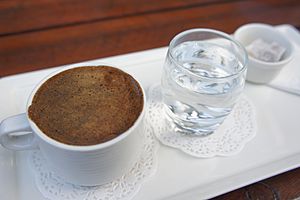Kurdish coffee facts for kids
Kurdish coffee (also known as Qehweya Kurdî or Qehweya Kezwanan in Kurdish) is a warm, traditional drink. It is also called menengiç coffee (menengiç kahvesi in Turkish). This name means pistachio coffee or terebinth coffee. It is a popular drink in Kurdish and Turkish cooking. This special coffee is made from the roasted fruits of the terebinth tree. These fruits are related to the pistachio nut. A great thing about Kurdish coffee is that it has no caffeine! It is especially popular in a region called southeastern Anatolia in Turkey.
What is Terebinth Coffee?
Terebinth coffee is not made from regular coffee beans. Instead, it uses the small, dark red fruits of the terebinth tree. This tree is also known as the "turpentine tree." It grows wild in many parts of the Middle East. The fruits are picked, dried, and then roasted. After roasting, they are ground into a fine powder. This powder is then used to make the drink. Because it comes from a fruit and not a coffee bean, it naturally has no caffeine. This makes it a good choice for anyone who wants a warm drink without the energy boost of caffeine.
How is it Made?
Making Kurdish coffee is a bit like making traditional Turkish coffee. First, the roasted and ground terebinth fruits are mixed with hot water or milk. Sometimes, a little sugar is added for sweetness. The mixture is then gently heated in a small pot, often called a cezve. It is stirred until it becomes thick and foamy. The coffee is usually served in small cups. It has a unique, slightly nutty and earthy taste. Many people enjoy it after a meal or as a warm treat.
A Look at Its History
People have been making and enjoying terebinth coffee for a very long time. This special drink has been produced in areas like Diyarbakır, Adıyaman, Mardin, and Batman in southeastern Turkey for over a hundred years. In the early 1900s, the roasted and ground terebinth fruits started to be sent to other countries. This helped share this unique drink with people around the world. Today, it is also known as a traditional specialty of Gaziantep, another city in Turkey. In recent years, you can even find the processed terebinth fruits sold as an oily paste in cans or jars. This makes it easier for more people to enjoy this traditional drink at home.
 | Frances Mary Albrier |
 | Whitney Young |
 | Muhammad Ali |


